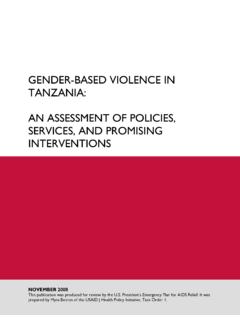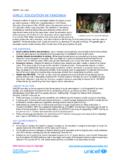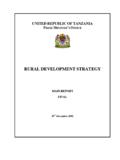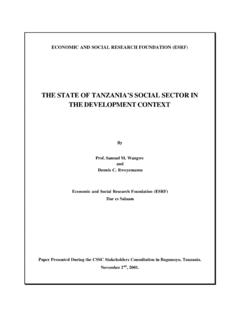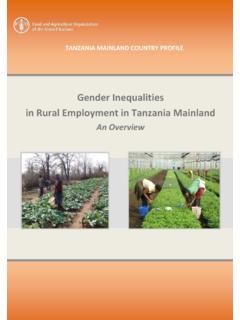Transcription of THE UNITED REPUBLIC OF TANZANIA
1 - THE UNITED REPUBLIC OF TANZANIA MINISTRY OF COMMUNITY DEVELOPMENT GENDER AND CHILDREN NATIONAL STRATEGY FOR GENDER DEVELOPMENT iiTABLE OF CONTENTS CONTENTS PAGE FOREWORD iv STATEMENT v Acronyms and Abbreviations vi CHAPTER I: BACKGROUND Introduction Layout of the NSGD Preparation of the NSGD Gender Development in TANZANIA Challenges Rationale for the NSGD Aim Goal and Objective of NSGD Links to other National Policies Definitions of Selected Gender Concepts 1 1 1 1 2 2 3 3 3-5 CHAPTER II.
2 POLICY CONCERNS Introduction Areas of Gender Concern Institutional Framework Decision-making and Power Legal and Human Rights Education Training Economic Empowerment Employment General and Reproductive Health HIV and AIDS Food Security and Nutrition Division of Labour Information, Education and Communication Appropriate Technology Environmental Protection and Conservation Access and Ownership of Resources Gender Mainstreaming Gender/Sex Disaggregated Data Social Security Community Participation 6 6 6 7 8 9 10 11 12 13 14 15 16 17 18 18 19 20 21 21 22 23 24 Customs and Traditions Gender and Advocacy CHAPTER III.
3 IMPLEMENTATION FRAMEWORK The Framework Roles and Responsibilities The Ministry of Community Development, Gender and Children Sector Ministries Central Ministries Local Authorities The Private Sector Community Development Partners CHAPTER IV: MONITORING, EVALUATION AND RESEARCH Monitoring and Evaluation Institutional Arrangements for Monitoring and Evaluation Research CHAPTER V: LOGICAL FRAMEWORK OF THE NSGD AND MATRIX Logical Framework of the National Strategy for Gender Development Annex 25 25 25 25 25 25 26 26 26 27 27 28 29 30-72 ivFOREWORD NATIONAL GENDER STRATEGY TANZANIA recognizes that gender inequality is a major obstacle to socio-economic and political development of its peoples.
4 Many studies have shown that gender inequality is one of the underlying causes of low productivity as it does, among other things, hamper the participation of at least half of the country s population. In recognition of this fact the government of the UNITED REPUBLIC of TANZANIA has taken various measures to ensure equality of all its citizens and, in particular, gender equality and gender equity. The Ministry of Community Development, Gender and Children was established in 1990 as the national machinery for spearheading gender development in the country.
5 The Ministry, among other things, has facilitated the formulation of the Women and Gender Development Policy (2000). The aim of this policy is to ensure that the gender perspective is mainstreamed into all policies, programmes and strategies. In order to meet this objective, the national machinery initiated the establishment of gender focal points in ministries, independent government departments, regional and local authorities. These focal points in turn will be responsible for gender mainstreaming in their respective plans and programmes, while working with the national machinery, which has a coordinating role in gender development.
6 This, together with other legislative, administrative and affirmative actions has enabled TANZANIA to record remarkable achievements in gender development. Notable areas in this regard are education, health and water; economic empowerment and participation in decision-making. Despite these achievements TANZANIA as a nation is still faced with a number of challenges. These challenges cannot be overcome without ensuring that all stake holders play their role in attaining that goal of gender equity and gender equality, as sine qua non for sustainable social and economic development.
7 It is in this regard that the National Strategy for Gender Development (NSGD) has been put in place. The National Strategy for Gender Development (NSGD) highlights the major issues of concern to gender equality while exposing the challenges ahead. It thus provides guidance on interventions to be made and identifies roles of various actors and stakeholders. The NSGD also suggests co-ordination mechanisms that will facilitate the participation of the various actors, and how they could create the requisite linkages.
8 It is hoped that the NSGD will not only make implementation of the Women and Gender Development more focused, but it will also make that implementation more result-oriented. I therefore, call upon all actors and stakeholders to identify their roles within the NSGD and play their part committedly. We acknowledge with thanks the inputs of all actors and stakeholders who so diligently worked to have this Strategy in place. Special tribute is paid to the World Bank who supported the ground who works for the Strategy and the UNITED Nations Fund for Population Activities co-ordinated the joint efforts of our Ministry and development partners.
9 We look forward to yet further co-operation between us. Dr. Asha-Rose Migiro MINISTER FOR COMMUNITY DEVELOPMENT, GENDER AND CHILDREN v STATEMENT NATIONAL STRATEGY FOR GENDER DEVELOPMENT The National Strategy for Gender Development is a step forward among other things towards laying foundation in promoting gender equality and equity in the country. It is one of the efforts in implementing the Platform for Action and the Fourth World Conference on Women. The government of TANZANIA has made a firm political commitment to support any initiatives that are focused at alleviating gender inequality in economic, education, training and employment at all levels.
10 Despite the various measures being undertaken to address gender equality and equity, the government still faces a number of challenges that continues to hamper its capacity in implementing its role of providing institutional support to all sectors to attain their missions with gender responsiveness. To be able to play this role effectively and efficiently more effort is needed. That is why the MCDGC has developed the NSGD with the objective of accelerating the attainment of gender equality in the Country.

